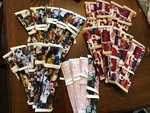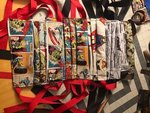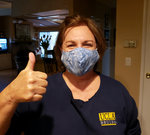


As the demand for face masks grows, sewists all over the county are coming together to provide fabric masks for senior care centers and other people in need through Repair Clark County’s Mask Project.
With more than 1,000 masks created and distributed, the project has helped many seniors and at-risk people stay healthy as the Centers for Disease Control and Prevention recently updated its recommendations to include wearing masks in public.
Repair Clark County Coordinator Terra Heilman started the Repair Clark County Mask Project after she started to feel the COVID-19 impact on the community, mentioning how she and her colleagues were sent home from work and she started brainstorming.
“My first thought was, we have some amazing sewists,” Heilman said.
For the past two years, Repair Clark County has upcycled fabric through their “re-wrap” program, which takes donated fabric and creates gift bags out of it for the holidays. According to Heilman, boxes upon boxes of donated fabric were sitting unused and she thought it would be a great idea to use the fabric for a current and pressing need: making masks.
“We gave these bags out as a way to upcycle the fabric and also normalize something that is reusable,” she said, mentioning how she then started to put together the mask program.
At first, Heilman said she was worried about the success of the program and wasn’t sure how big the need for masks would be as she started working on the project before the stay at home order was issued.
“I didn’t want to be acting with emotion and just assess the situation,” she said. “But I suspected that wasn’t going to happen and you know, of course, we are where we’re at now.”
At the beginning of April, the Centers for Disease Control and Prevention recommended that all Americans start wearing face masks in public, whether they were experiencing symptoms of COVID-19 or not.
“We have way more requests than we can fill right now,” she said.
Heilman said that while the needs of the community grow, they also evolve to needing different things. A few days ago, Heilman added a few extra steps to the mask instruction document to address the need of “ear savers,” which are additions to a traditional mask that let the mask attach to the back of the skull instead of behind the ears. Along with ear savers, Heilman said she found a way to use T-shirt material to make ties for the sides of the masks.
Many other community programs are working along with Columbia Springs and its Repair Clark County program to fulfill the rising need of face masks. According to Heilman, the Fort Vancouver Regional Library consolidated all of its 3D printers into one location to make the ear savers she mentioned. Other repair groups in Clark County are sharing their contact lists with the mask program and helping deliver the units all over the county.
“I fairly recently met a woman named Sarah Sheets that runs a non-profit called Caring Closet,” Heilman said, explaining that Caring Closet takes in and donates all unwanted medical equipment to local people and centers that need it.
Everything from walkers and crutches to adult diapers get donated through the Caring Closet program. After Heilman and Sheets made a connection, they teamed up to distribute the masks to those that needed them the most.
“We got together with these community partners that already have the infrastructure set up to do the distribution and that’s been amazing,” Heilman said. “I’m not having to reinvent the wheel.”
Although the program isn’t able to give a mask to every single person in the area, Heilman said she feels like it’s making a difference.
“Even if these masks aren’t N95 and not certified personal protective equipment, we can get them to the people who are vulnerable and that eases the need and demand for N95s and hopefully those can be diverted to the people that truly need them,” Heilman said.
While the program may be in full swing, Heilman said volunteers and materials are still needed to help fill the needs of even more people.
“Sewists are our biggest need right now,” she said, asking people in the community that know how to sew to help out if they can.
Along with volunteer sewists, the program is in need of elastic to create the “ear saver” portion of the facemasks and anybody that has extra elastic to donate what they can.
If you are interested in volunteering or donating to the face mask program, visit columbiasprings.org/repair or send an email to Heilman at repair@columbiasprings.org. Information on how to create your own fabric facemask can be found at https://bit.ly/3bjhWyY.